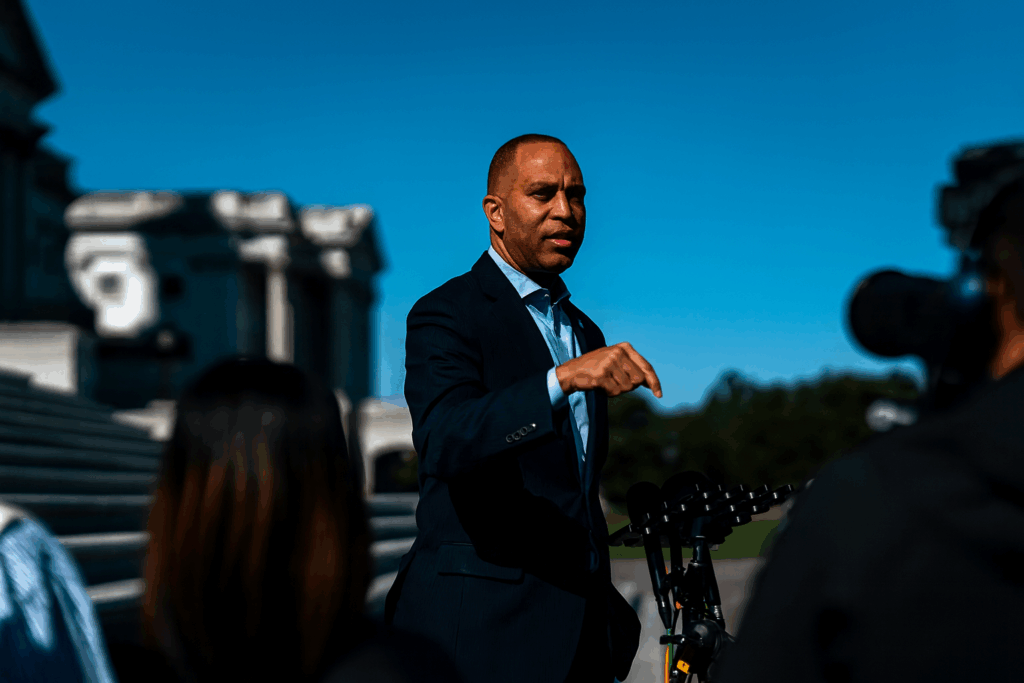An upstate New York man pardoned by Donald Trump after the Jan. 6, 2021, Capitol attack has been charged with a new crime: threatening to assassinate Hakeem Jeffries, the House Democratic leader. The arrest shows how broad clemency for political offenders intersects with rising threats against U.S. lawmakers.
Christopher P. Moynihan, 34, of Clinton, N.Y., was indicted on a felony count of making a terroristic threat. New York authorities say he texted that he planned to kill Jeffries at a public event in New York City. According to the complaint, Moynihan wrote, “Hakeem Jeffries makes a speech in a few days in NYC, I cannot allow this terrorist to live.” He added, “Even if I am hated, he must be eliminated. I will kill him for the future.”
Jeffries was scheduled to speak at the Economic Club of New York in Manhattan. In a statement, he thanked law enforcement for their work and said: “Since the blanket pardon that occurred earlier this year, many of the criminals released have committed additional crimes throughout the country … threats of violence will not stop us from showing up, standing up and speaking up for the American people.”
Moynihan’s legal history underscores the seriousness of the situation. He was among the early Jan. 6 rioters who breached police barricades and entered Capitol grounds. He made his way into the Senate chamber. Prosecutors say he rifled through a senator’s notebook during the riot, declaring: “There’s gotta be something in here we can f*cking use against these scumbags.” He was convicted in August 2022 of obstructing an official proceeding and pleaded guilty to five misdemeanors. In February 2023, he was sentenced to 21 months in prison.
Then came the pardon. On January 20, 2025, President Trump issued a blanket clemency for nearly 1,600 people charged in connection with Jan. 6, including Moynihan. Now, one of those pardoned is accused of threatening lethal violence against a sitting member of Congress. This raises serious questions about how the justice system handles politically motivated offenders and the message such pardons send.
Law enforcement officials say threat investigations against members of Congress in 2025 have already topped 14,000. This number is higher than the total handled in 2024. This case, involving a former rioter turned alleged would-be assassin, puts political violence at the center of national security talks.
Local authorities in Dutchess County, N.Y., say Moynihan was held at the Justice and Transition Center. His bail conditions include $10,000 cash or a partially secured $80,000 bond. Prosecutors are still reviewing the case for legal and factual sufficiency.
Beyond this threat, the incident poses a deeper policy dilemma. Broad use of clemency by the executive branch, especially for those shaped by extremism or violence, heightens risks. Recidivism and new threats to public officials grow. As one legal scholar put it, such pardons “create a mockery of the rule of law and signal that political violence carries no lasting consequences.”
In the coming weeks, Congress and law enforcement must ask: Are current protections for lawmakers enough? Should there be better monitoring of pardoned individuals convicted of political violence? What standards should apply when the president pardons those involved in assault, obstruction, or threats?
For now, Jeffries and others lead under threat. Yet as Jeffries said: “Threats of violence will not stop us from showing up, standing up and speaking up for the American people.” Christopher Moynihan’s arrest is a stark reminder: the aftermath of Jan. 6’s violence remains alive. Safeguarding democracy sometimes means confronting threats from within.


